Daily Chart:
4 sparrows, 1 week old
2 chimney swifts, 2 days old
3 crow size birds, about 1 week, brownish/orange skin, feet
same color, wing feathers black/blue/brown, insect eaters, long legs.
1 cottontail, opened eyes today
2 opossums, 5 months, not releasable, crippled
-------------------------------------------------------
Opossums Rescue and Rehabilitation
| 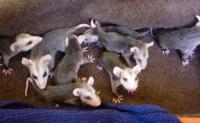 | | Most opossum babies end up orphaned, because their mother was hit by a car (their only real defense is to play dead...) or killed by dogs.
So PLEASE, if you care and you happen to hit an opossum with your car - accidents happen - take a minute and make sure that there are no babies on the animal, because they usually survive a lot within momma's pouch. After all, they are America's only Marsupials. |
| | Movies | | April 13, 5 new arrivals, 6 weeks old (571 KB, mpg) | April 17, licking milk from eyedropper (1.3 MB, mpg) | April 17, licking milk from eyedropper (1.3 MB, mpg) | | April 22, eating out of bowl first time (1.3 MB, mpg) | April 23, release of 4 months old (1.9 MB, flash) | May 4th, outside enclosure
(1.3 MB, mpg) |
 |
|
|
 |
|
| Opossum Facts - North America's only marsupial (female has a pouch) mammal. The female carries and nurses her young in her marsupium until they are about 2 to 3 months old; then they are carried on her back another 1 to 2 months whenever they are away from the den.
- Size of a cat; grey to black fur; black eyes; pink nose, feet and tail; black ears; and pointed nose.
- Solitary and nocturnal: usually slow moving; when frightened and unable to flee may fall into an involuntary shock-like state, "playing 'possum".
- Hiss or growl and show their 50 sharp teeth when frightened; but, in reality, they are gentle and placid— they prefer to avoid all confrontations and wish to be left alone.
- Omnivorous: eats insects, snails, rodents, berries, over-ripe fruit, grasses, leaves, and carrion; occasionally will eat snakes, ground eggs, corn or other vegetables.
- Adaptable; able to live wherever water, food, and shelter exist. At home in trees; uses its prehensile tail to help stabilize position when climbing— it does not, however, hang by its tail.
- Few live beyond the age of 1 year in the environment; rare reports of living 5 to 10 years in captivity. Killed by many predators: humans (and cars), dogs, cats, owls, and larger wildlife.
- Opossums are solitary nocturnal animals, but may become diurnal in cold weather. They build the nests in tree hollows and spend most of their time there. Opossums don't hibernate, but remain inactive during severe frosts. Without nests Opossums are unable to survive.
|  | 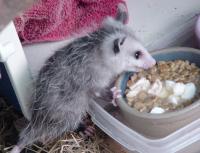 | Sometimes they choose garages and attics as their temporary quarters because they are pushed out of their natural habitat and forced into closer proximity to people. In the wild Opossums have many predators: dogs, cats, owls, foxes, and other larger wildlife, but mostly Opossums suffer from humans and cars. In danger Opossums can feign death or drool heavily for a predator to think the Opossum is sick and unappetizing. Or they hiss and growl, showing sharp teeth, but it's only a bluff. These gentle and placid animals prefer to avoid confrontations. |  | | Opossums have several ways of picking things up. Their back feet have opposable toes like the man's thumb. They can wrap the tail around things or hang on the tail, like monkeys do. They can also use their front feet for picking up things although they don't have opposable thumbs. Opossums don't have their own territory, but they are always on the move in search for food. Females stay in smaller areas while they can care for the youth. Opossums make clicking sounds during mating season or hiss and growl if threatened. | 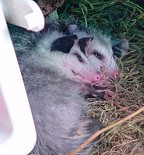
|
| 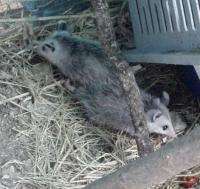 | Opossums - Habitat Opossums inhabit the United States east of the Rocky Mountains, Central America, and Pacific coastal North America. The Virginia Opossum is the only marsupial found in the North America. In South America and Australia there are about 80 species of Opossums. Opossums lived during the era of dinosaurs - fossil remains have been found from 70 million years ago.
|  | | Opossums - Reproduction The breeding season for Opossums begins in December and may continue through October with most of the infants born between February and June. Like all marsupials, Opossum females have a well-developed pouch. They produce an average of 7 young, once or twice a year (litters of 17 kids have been reported). At birth, the infants are hairless, embryonic-looking, and weigh about 0.1 grams because the period of gestation is 12-13 days and because they are born at a very early stage in their development. | 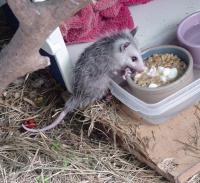
|  | 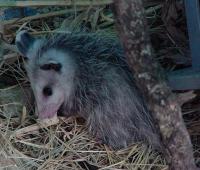 | Young Opossums have to make a long and difficult journey from the birth canal into the pouch and latch onto a teat. The mother helps by licking the hair leading into the pouch. There are only 13 teats in the pouch and not all may be functional, so the excess infants will not survive. The young open the eyes at around 60-70 days and are weaned at about 100 days of age. Then they are often carried as they cling onto the mother's back. After separation from the mother, littermates may share common dens for some time. Very few young Opossums survive to become adults. |  | | Opossums are considered to be furbearers, but they are not taken in large numbers because their pelt has little value. Opossums are nature's sanitation engineers; they eat road-kill, carrion, rotting fruits, and pests. Also Opossums are of great interest for scientists since they are the only marsupials in America, while Australian marsupials are driven to extinction by more modern mammals. | 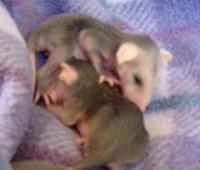
|
| 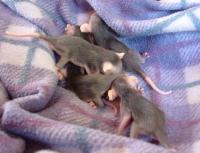 | Weight: 9-13 lbs (4-6 kg). Some species reach only 300 gr.
Length: 15-20 inches (38-50 cm). Some species are 10-12 inches.
Life Span: 1-2 years in the wild, up to 10 years in captivity. |  | | Opossums - Conservation In the wild Opossums are closely linked with the ecology of the forests. Devastating fires destroy nest-sites and cause great declines in Opossums populations. Tall, straight trees favored by wild Opossums are highly valued for the production of timber. The technique of tree removing is very detrimental for all animals, including Opossums. The population crash has already begun and extinction of some species of Opossums in the South America and Australia is possible. | 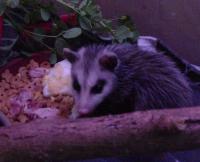
|  | | 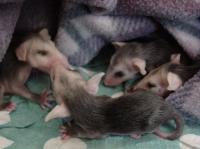
| Opossums - Diet Opossums don't have any methods for storing food or energy so they need stable food sources and that's why their diet is so varied. Opossums feed mostly on carrion. Other food sources for the Opossum include garbage, grass, leaves, insects, frogs, small birds and rodents, snakes, and earthworms. Opossums like to treat themselves with berries, seeds, flowers, and fruits and their favorites are persimmons, apples, and corn. |  | | Photos | 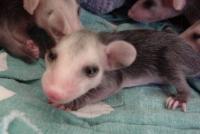 | 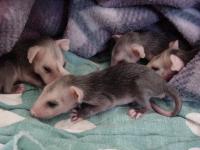 |  | | 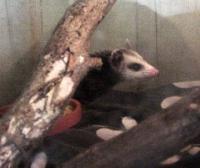
| 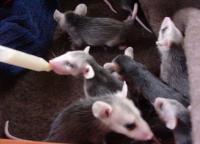
|  | 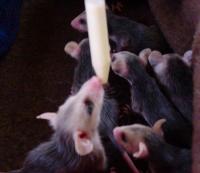 | 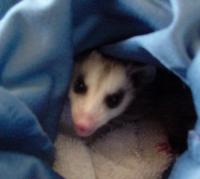 |  | 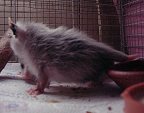 | 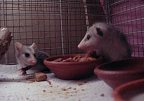 | 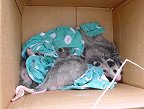 | | Opossum with 3 legs, birth defect | Dwarf Opossum with big 3-legged sister | 6 Opossums a minute before release | |
| | |






















No comments:
Post a Comment